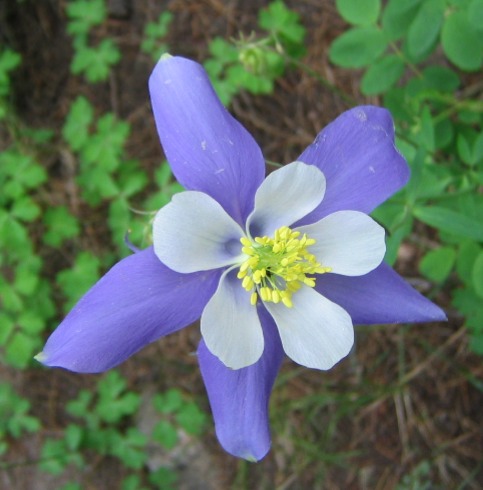The conversation around the table turned to the gushing oil in the Gulf of Mexico, the sense of powerlessness we all feel to do anything about it. We know our lifestyle is driving the need for oil. We know how complex the economic problems are, the entrenched special interests. “What can we really do?” asked one person.
 “What about reciprocity?” I asked. At bottom, our ecological crisis boils down to one simple fact: humans are taking more than we’re giving back to the Earth. What if each of us started giving back as much as we take—in all our relationships, with the human and more-than-human worlds? Even a simple gesture like showing gratitude can make a difference. Everyone loves to be thanked! Reducing our use of unsustainable resources is a solid first step in giving back to the Earth.
“What about reciprocity?” I asked. At bottom, our ecological crisis boils down to one simple fact: humans are taking more than we’re giving back to the Earth. What if each of us started giving back as much as we take—in all our relationships, with the human and more-than-human worlds? Even a simple gesture like showing gratitude can make a difference. Everyone loves to be thanked! Reducing our use of unsustainable resources is a solid first step in giving back to the Earth.
What follows are 10 close-to-home ways you can give back to the Earth.
1. Eat closer to home. The average American foodstuff travels 1500 miles to reach the table. That’s an astronomical amount of fossil fuel used just in transporting the food, to say nothing of growing and packaging it. Until our fuel sources are more sustainable, perhaps those bananas or Australian wines (to pick two of my faves) should be a special treat, not a staple. For more info, see the energy stats at Sustainable Table.
2. Thank your food. Look, really look, at the plants and animals on your table. Notice each one. Think about the rice or oat or wheat grasses waving under the sun, the carrots developing underground, the strawberries ripening on the vine. Most of all, if you eat meat, think about every animal. Picture the cow grazing (if you eat cows, eat grass-fed, not corn-fed ones), the chicken scratching, the fish swimming, the life labor that the hen put forth in making an egg, the goat her milk.  Thank each animal, every time, for the gifts of their lives and their bodies. Christians call it saying grace. Buddhists call it eating mindfully. All of us can thank the plants and animals. Our lives depend on them. Literally.
Thank each animal, every time, for the gifts of their lives and their bodies. Christians call it saying grace. Buddhists call it eating mindfully. All of us can thank the plants and animals. Our lives depend on them. Literally.
3. Pick your teeth the old-fashioned way. Wooden toothpicks are biodegradable, unlike the little plastic gadgets most dentists’ offices try to pass out to their patients. Those tiny plastic picks and brushes only end up in landfills—not a good way to give back to the Earth! Many of them escape down rivers, becoming part of the enormous swirling toilet bowls of plastic in our oceans and endangering the lives of seabirds. When your dentist offers you little plastic tools for dental hygiene, say no thanks.
4. Teach your children reciprocity. Even small children understand fairness. No one wants to get the short end of the stick. Teach your children to give back when they receive something. Practice it yourself. If each of us truly gave as much as we took, the world would change.
5. Thank a tree. As you walk down your street, notice one tree or plant every  day. Thank it for making oxygen. Your life depends on it.
day. Thank it for making oxygen. Your life depends on it.
6. Work to reduce pesticide use in your area. We all know about pesticide use in agriculture, but pesticides are used at an equivalent rate on suburban lawns. What about the playing fields at your local school? (Fungicides and herbicides are pesticides too.) Children absorb more pesticides per pound of body weight than do adults, according to the National Academy of Sciences. Next on my to-do list: a letter to my local HOA about the annual pesticide application on our pristine common lawn. I’d really rather have a common area that my dog—and all the children on the street—can run and play in safely. For more info, see the “Lawn Care” page at Beyond Pesticides.
7. Refuse overpackaging. Say no thanks to foods or supplements prepackaged in tiny portions. Every piece of plastic ends up in a landfill—if we’re lucky and it doesn’t end up on beaches or in the ocean. Though I love a certain brand of rice cheese, I’m giving it up because it is packaged in individual slices wrapped in plastic.
8. Host a zero-waste party. It’s easier than you think. Paper plates and cups can be composted in municipal composting processes, and cornstarch-based compostable flatware is becoming easy to find. To use even fewer resources (except for water), visit your local thrift store and buy a few dozen older plates and forks and wash them afterward. If you don’t have room to store them, donate them back after the party’s over. Same with napkins and glasses. I spent $25 at a thrift store for my last party and then got credit afterward for the same amount in donation. That thrift store benefits a nonprofit group, so when they sell their merchandise twice they raise even more money.
9. Volunteer for a cleanup or restoration project in your area. People have no idea how much fun these projects are. You get the pleasure of meeting like-minded neighbors in addition to the joy of giving back to the Earth in a very direct way. The sense of camaraderie and a deep-seated satisfaction after a day or a half day of work keep restoration volunteers coming back time after time. They look forward to having more fun. For a list of organizations working in ecological restoration around the country, see Global Restoration Network. (Update: Link no longer available.)
10. Work for the circle of life in your industry. I was astonished to learn recently that nearly half of GM plants are now “nil to the landfill.” If an industry like auto making can stop sending materials to landfills, certainly other industries can follow suit! How did the Earth survive for billions of years, perfecting the ability to sustain life? By a system of exchange in which every part of the whole gives off something others need. One species’s waste is another species’s fuel. What the organisms of Earth have been doing for billions of years, we will have to learn to do in every industry. Waste to fuel, around the circle. That means finding ways to break down plastics, mop up oil spills, and treat sewage by contributing something that someone else in the ecosystem needs. Interdependence is the name of the survival game. What if you are not an engineer or inventor? Then start with recycling. Even your office could be zero waste.
Since the oil spill, we have seriously minimized our plastics consumption. My children have also joined me in veganism. It is hard for me not to be saddened and even occasionally to slip into despair when I consider the great damage already done to world, but my son’s and my daughter’s emerging sense that integrity requires action brings me hope.
Hystery, your and your children’s commitment do indeed bring hope. Thank you!
Excellent points, and what I like most of all is how the idea of reciprocity ties them all together and spawns many more ideas for a healthier relationship to plants, animals, people, earth. The sense of reciprocity is one that many indigenous cultures have but it goes against the grain of capitalism and some tendencies in American individualism. Cultivating reciprocity is truly a radical act in our society.
Elizabeth, I couldn’t agree more. Reciprocity is revolutionary.
Priscilla, thanks so much for this simple reminder that we call all make a difference. When I get around to posting on my counseling blog, I’ll make a point to link to your post! Happy to spread the word!
Tamara G. Suttle
http://www.TamaraSuttle.com
http://www.AllThingsPrivatePractice.com
Tamara, thanks for stopping by! Yes, every action we take makes a difference, one way or another, doesn’t it?
Priscilla, what a fabulous list of 10! I’ll Twit it for sure. I’d like to especially thank you for including #2, #4, and #5 in your list, which all seem centered in the belief that energy flows in a continual desire to nurture life. Acknowledging this flow through gratitude and reciprocity also acknowledges the resilient powers of the Earth.
Deb O’Connor, a gifted astrologer and writer (and editor of the esteemed publication Northern Lights, no longer being published), articulates in her recent newsletter another important way of giving back, though she uses different language:
“I want to stress how important it is to reflect back to the state of your emotional courage a year ago and then notice where you are today,” she writes. “Though outer events in the world completely contradict my sense that we are creating more and more inner balance, I’m holding on to my belief that….the human species is bravely, and often unknowingly, moving into a higher and higher energetic vibrational level. We ARE moving…watch for the way light seems to be working its way into the most unexpected places…”
You can sign up for Deb’s newsletter by contacting her at http://www.lovedogdesign.com.
So perhaps there is an 11th way to give back to Earth – by being a faithful guardian of our thoughts, and sending only those out into the Universe that bring more light.
Thank you.
Page Lambert
Connecting People with Nature
Connecting Writers with Words
http://www.pagelambert.blogspot.com
Page, I totally agree–thoughts make a difference. And then they need to be backed by our actions–to keep our own body and mind in alignment, and then to foster that same kind of wholeness in the rest of the world.
Priscilla, what a beautiful list. Each one is important, and I especially like the ones on gratitude and recycling. (We’ve got a huge single-stream recycling bin now, and almost no trash.) A thought: feel free to let me know if you and/or other BMWs might like to bring zero waste plates, etc. as your part of of the BMW potluck.
Gail, we could make every Boulder Media Women potluck a zero-waste event! We can certainly bring our own plates and dinnerware, and we can make sure any paper plates go to the local composting program. Maybe hostesses could supplement the flatware with corn-starch forks, and they could go to the composting center too. Maybe some guest would volunteer to bring these forks as her contribution to the dinner. Hey, I could do that!
As always, your post of well written and well said!
Thanks, Puny Human. And thanks for keeping it all in perspective with your name.
Priscilla,
Another great post. Just about everything on your list has to do with living consciously–and I believe that living consciously is important. If we want to survive as a species, we must move through the world with more attentiveness, more consciousness about our impact, and more reverence and respect. And we must remember the oneness to all things. When we thank a tree or tomato, a beautiful sunset or raging thunderstorm, we are thanking that oneness.
Melanie Mulhall
“More reverence and respect”: yes! Thank you, Melanie. The oneness is literal, physical: this Earth is one atmosphere, one watershed, one ecosystem. No separation! And room for lots of individual variation.
How easy it is to forget to be thankful for–and to consciously give thanks to–the earth’s plants, animals, water, trees and all natural resources. We humans couldn’t survive outside of the web of life!
How right you are, Laurel! Some indigenous traditions say that of all the animals, humans are most likely to forget our connections to others in the web of life. I think they’re right.
Thanks for this thoughtful list, Priscilla. I was glad to see you mention the zero-waste event idea. My husband and I had a zero-waste wedding. Even though we had over 100 guests, it was *very* easy to host it as a zero-waste event. In Boulder, Ecocycle makes this very easy! Linda
Congratulations on getting married with zero waste! 🙂 Yes, zero waste is easy here–just request a composting kit from Eco-Cycle, which includes compostable dinnerware and flatware, and pick it up and return it to the facility. (See details here.) I’m glad municipal composting has begun too.
Good list to remind us to take every small green step that we can.
Re GM and its plants, half of which are now “nil to the landfill.” Subaru of America, whose plant is in Indiana, made that commitment back in 2004. See http://www.subaru.com/csr/environment-sustainability.html
Claire, I’ve been astonished to learn this about the auto industry. (And good for Subaru! I have a personal interest in that brand–sitting in my driveway.) If an industry as huge and potentially waste filled as auto manufacturing can turn toward zero waste, then it gives the lie to any who claim that significant environmental change is impossible. In a bottom-line economy, the costs of waste and environmental damage simply have to outweigh the profits. Because those costs have traditionally been hidden, there has been little incentive to change course. I’m glad to see the trend is changing.
Priscilla,
This a wonderful list of ten easy things to do–gratitude is so important to raise our awareness. And raising awareness precedes behavior change.
Ever since I spent several weeks eating for $2 a day, I’ve been much more aware of what I consume and its source. And an extended period of doing with less, certainly makes us notice when we have more.
Thank you for this. Each step, however small, toward sustainability is a good one.
All good wishes!!
Anne